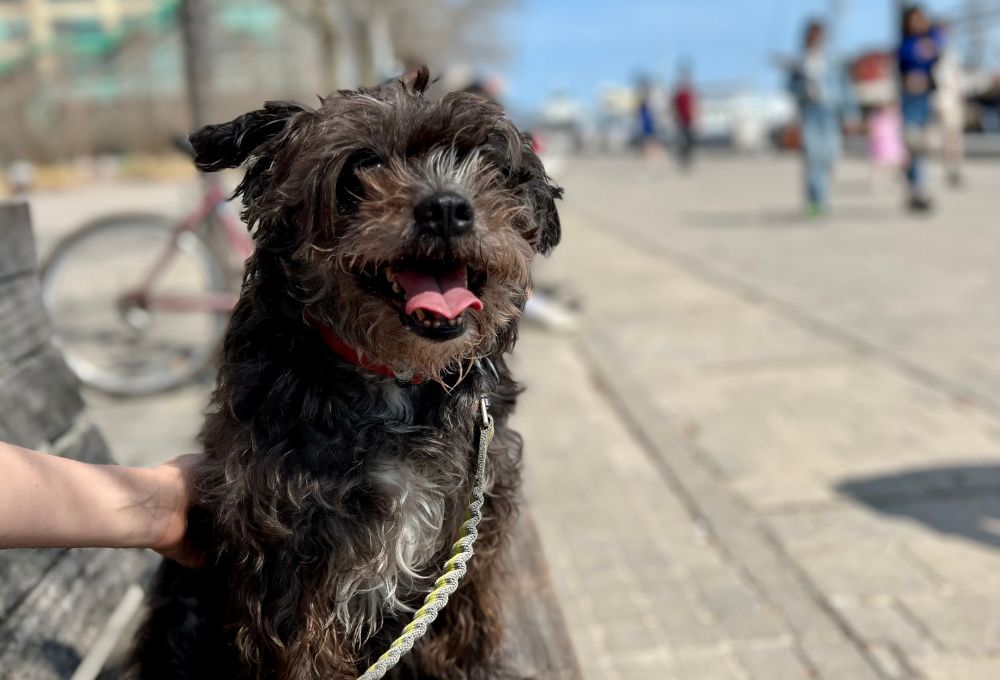
Are you considering adopting a senior dog? We know it is not a light decision and it comes with joys and challenges, but we want to ensure you have a successful adoption journey. 🐶💝
In this article, we will delve into various aspects of adopting and caring for a senior dog, from understanding their unique needs to building a strong bond with your new companion. Whether you’re a first-time dog owner or an experienced pet parent, this guide will serve for navigating the world of senior dog adoption.
1. The Benefits of Adopting a Senior Dog
There are tons of reasons, but in case you are wondering here are my favorites:
- The Wisdom of Age: They have already gone through the exuberance and energy of their youth, and now they offer a calm and steady presence. Their wisdom can be seen in the way they approach new situations with a level-headedness that only comes with age.
- Unconditional Love and Gratitude: When you adopt a senior dog, you are giving them a second chance at a happy life. The gratitude they express is immeasurable, and their love is truly unconditional.
- Established Personalities: Unlike puppies, senior dogs have already developed their personalities, which makes it easier to find a dog that matches your lifestyle and preferences.
- Lower Energy Levels: If you have a more relaxed lifestyle or prefer a companion who doesn’t demand intense physical activity, a senior dog may be the perfect match for you. They are content with a leisurely walk, a cozy spot to nap, and quality time with their human.
- Saving a Life: Older dogs often face a higher risk of euthanasia in shelters due to their age and the challenges of finding them forever homes. By choosing to adopt a senior dog, you are giving them a chance to live out their golden years in comfort and happiness.
2. Preparing Your Home for a Senior Dog
Now that I convinced you to adopt a senior dog, it is time to prepare your home to help your furry friend settle in smoothly. No worries, I will guide you through the process.
- Pet-Proofing Your Home: Identify and address any potential hazards in your living space. Start by securing loose cords, tucking away toxic plants, and ensuring that cleaning supplies and chemicals are stored safely out of your dog’s reach. Make sure all electrical outlets are covered, and fragile items are stored in secure places.
- Creating a Cozy Retreat: Senior dogs appreciate having a designated space where they can relax and retreat when they need some alone time. Set up a comfortable bed or blanket in a quiet area of your home, away from high foot traffic and noise.
- Mealtime and Water Stations: Choose bowls that are easily accessible for your dog, especially if they have mobility issues or arthritis. Consider elevated feeding stations to ease the strain on their joints and make mealtime more comfortable. Ensure fresh water is always available, and clean the bowls regularly to maintain proper hygiene.
- Secure Outdoor Spaces: If you have a backyard or outdoor space, it’s crucial to make it secure for your senior dog. Check for any gaps or openings in fences that could allow your dog to escape. Ensure there are no toxic plants or substances within their reach. Additionally, provide shade and shelter to protect them from extreme weather conditions.
- Establishing a Routine: This provides them with a sense of predictability and stability. Set consistent meal times, exercise schedules, and bedtime routines. Dogs, like humans, feel more secure when they know what to expect.
- Introducing Family Members and Pets: If you have other family members or existing pets at home, it’s important to introduce them to your new senior dog gradually. Take it slow and supervise their interactions to ensure a smooth integration. Provide positive reinforcement and praise when everyone gets along, and be patient as they adjust to one another.
3. Understanding the Unique Needs of Senior Dogs
It’s important that you are aware of the specific needs of your senior dogs and properly address them to provide the best possible care and ensure a happy and healthy life.
- Regular Veterinary Care: The first step is to schedule an initial visit to evaluate their overall health and catch any potential issues early on. Additionally, discuss with your vet the frequency of check-ups and any specific health concerns associated with your dog’s breed.
- Nutrition and Weight Management: Senior dogs may benefit from a diet specifically formulated for their needs, which often includes lower calorie content to prevent weight gain and supplements to support joint health and mobility.
- Exercise and Mental Stimulation: Adjust exercise routines to suit their abilities, incorporating gentle walks, interactive play, and mental stimulation activities such as puzzle toys or nose work.
- Joint and Mobility Care: Many senior dogs experience joint stiffness, arthritis, or other mobility issues. Provide them with comfortable bedding that supports their joints and minimizes pressure points. Consider using ramps or stairs to help them access elevated surfaces such as sofas or beds. Additionally, your veterinarian may recommend joint supplements or medications to alleviate pain and promote mobility.
- Dental Care: Senior dogs may be more prone to dental diseases such as gum inflammation or tooth decay. Establish a regular dental care routine, including brushing their teeth with dog-friendly toothpaste, offering dental chews or toys, and scheduling professional dental cleanings when necessary.
- Cognitive Stimulation and Enrichment: Engage in interactive play sessions, teach them new tricks or commands, or introduce puzzle toys that challenge their problem-solving skills.
4. Building a Bond with Your Senior Dog
Strengthening the bond with your furry companion will enhance their overall well-being and bring you both immeasurable joy.
- Spend Quality Time Together: Dedicate regular, uninterrupted quality time to spend with your senior dog. Engage in activities they enjoy, such as leisurely walks, gentle play sessions, or simply relaxing together.
- Practice Gentle Touch and Massage: Take the time to stroke their fur, massage their muscles, and provide soothing touch. Not only does this promote relaxation and comfort, but it also deepens the connection between you and your furry friend.
- Use Positive Reinforcement and Rewards: Reward desired behaviors with praise, treats, or affection. This approach fosters trust, builds confidence, and encourages a positive association with training and interactions. Avoid punishment or harsh corrections, as these can damage the bond and create fear or anxiety.
- Practice Active Listening: Observe your senior dog’s body language, facial expressions, and vocalizations. Pay attention to their needs, preferences, and signals of discomfort or anxiety.
- Engage in Enrichment Activities Together: Explore new places, go on leisurely outings, or introduce them to novel experiences in a positive and controlled manner.
- Maintain a Positive and Calm Energy: Dogs are highly sensitive to our emotions and energy. Create a soothing and reassuring environment for them and helps them feel secure and relaxed in your presence. Avoid raising your voice or displaying negative emotions, as these can cause stress and erode the bond you’ve worked hard to build.
- Adapt to Their Changing Needs: Be adaptable and responsive to changes. Whether it’s adjusting their exercise routine, providing additional support for their mobility, or addressing any health issues, your willingness to adapt shows your care and deepens the bond.
5. Additional Resources
To further support you on your journey of adopting and caring for a senior dog, here are some additional resources you may find helpful:
- Local Animal Shelters and Rescue Organizations: Reach out to your local shelters and rescue organizations to inquire about available senior dogs for adoption. They can provide valuable information and guidance throughout the adoption process.
- Veterinary Care: Establish a relationship with a trusted veterinarian who specializes in senior dog care. They can provide comprehensive health assessments, personalized advice, and ongoing support.
- Senior Dog Training Classes: Enroll in training classes specifically tailored for senior dogs. These classes focus on their unique needs and provide opportunities for socialization and mental stimulation.
- Professional Dog Trainers and Behaviorists: Seek assistance from professional dog trainers or behaviorists if you encounter specific challenges or behavioral issues with your senior dog. They can provide personalized guidance and training strategies.
- Books and Publications:
- Susie’s Senior Dog. This book is a compilation of true stories written by the founder of the popular social media account, Susie’s Senior Dogs. The author includes tales of the transformations that occur when a senior dog finds their forever home, provides resource for those interested in adopting, and advice and guidance on how to take good care of them.
- My Old Dog: Rescued Pets with Remarkable Second Acts. This book presents inspiring stories of senior dogs who have been rescued and found new purpose and joy in their later years. Written by Laura T. Coffey, the book highlights the incredible resilience and spirit of older dogs, proving that age is no barrier to living a fulfilling life. The book also includes beautiful photography that will melt your heart. 🥹💝
Conclusion
We explored various aspects of adopting a senior dog and provided valuable information to ensure you have a successful experience. Making a decision like this is not easy, and should not be taken lightly but it’s full of rewards.
Remember to understand the unique needs of senior dogs and accommodate their abilities. Provide your senior dog with regular veterinary care to maintain their health and well-being. Build a strong bond through quality time, gentle touch, active listening, and positive energy. And most importantly, cherish every moment with your dog and create lasting memories together.
FAQs
They do! However it is a process, and you have to be patient and willing to put the effort. Remember that they had a life before you and some of the experiences may not have been the best. So be empathetic and show them why they can trust you.
Some of them may find difficult to be left alone, while other dogs can be ok up to 6 hours. Every dog has different needs. It’s essential to observe your senior dog’s behavior and provide them with the right balance of alone time and social interaction based on their comfort level and personality.
Yes! older dogs are capable of forming deep and meaningful bonds with their new owners. They are aware that you are proving them an opportunity to have a better life and they will make sure to show you their gratitude and loyalty.
Ensure that your home is safe and suitable for an older dog. Stock up on necessary supplies, including age-appropriate food, bedding, and any required medications. Schedule a veterinary check-up to assess the dog’s health. And prepare yourself and your family for the commitment of caring for an older dog.
Create a calm and secure environment. Establish a consistent routine to provide them with a sense of stability. Spend quality time with them, engaging in gentle activities such as short walks or play sessions.
Don’t forget to share some love on our socials 💝🐶🐾
Recent Posts:
- Amazon’s Top Black Friday and Cyber Monday Deals for 2024: Dog Products Edition
- Top Pet Trackers for Sending Your Dog with a Pet Sitter
- Should Dogs Wear Bells?
- Which Dog Breed Has the Longest Lifespan?
- What Your Dog’s Poop Reveals (Healthy Poops and Warning Signs)
Recent Posts
Amazon's Top Black Friday and Cyber Monday Deals for 2024: Dog Products Edition
The holiday shopping season has officially started and Amazon has already released some incredible deals on pet products for Black Friday and Cyber Monday 2024. Here is our curated list of the...
As someone who boards dogs as a side gig, I am used to seeing many pet trackers and smart collars these days. These devices have become a must-have tool for pet owners (especially when trusting their...
